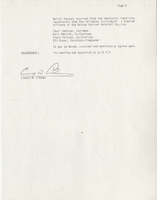Search the Special Collections and Archives Portal
Search Results

Transcript of interview with Sonja Saltman by Barbara Tabach, August 18, 2015
Date
Archival Collection
Description
Included in this oral history are reminiscences of Sonja Saltman's personal non-Jewish heritage in Austria, the importance of her grandmother in her life, and how she recalls becoming part of the Jewish community.
Sonja Saltman is a psychologist and philanthropist in Las Vegas, Nevada. She is executive director and co-founder of the Existential Humanistic Institute, a non-profit organization based in San Francisco, California that offers training in existential-humanistic therapy and theory. In 2003 Sonja and her husband Michael Saltman founded the Saltman Center for Conflict Resolution at the University of Nevada, Las Vegas (UNLV) William S. Boyd School of Law. The Saltman Center is focused on research, teaching, and public service related to "the advanced study of the nature of conflict and how to resolve it." A native of Austria, Sonja Saltman also serves as the Honorary Consul for Austria in Las Vegas. The Saltmans are involved with multiple charitable organizations and initiatives, both locally and abroad. Sonja Saltman has served on the boards of the Anti-Defamation League, Nevada Women's Philanthropy, and the Black Mountain Institute. Projects that the couple has supported include the rebuilding of homes and bridges is Bosnia, and Streetball Hafla, a basketball program to improve relations between Jewish and Arab teenagers in Israel. In 2014 Sonja and Michael Saltman were recognized as Distinguished Nevadans by the Nevada System of Higher Education. Included in this oral history are reminiscences of her personal non-Jewish heritage in Austrian, the importance of her grandmother in her life, and how she recalls becoming part of the Jewish community.
Text

Transcript of roundtable interview with the Holocaust Resource Center: Myra Berkovits, Susan Dubin and Doug Unger, by Barbara Tabach, September 4, 2014
Date
Archival Collection
Description
Interview with Myra Berkovits, Susan Dubin and Doug Unger of the Holocaust Resource Center. In this interview, the group discusses the beginnings of what is now the Sperling Kronberg Mack Holocaust Resource Center. Edythe Katz-Yarchever is discussed as the catalyst for establishing the center and getting others involved with the Governor's Advisory Council on Education Relating to the Holocaust. Berkovits talks about her role as a liason for Holocaust education in the Clark County School District and the student-teacher conferences held each year with funding from Sheldon Adelson. Unger discusses expanding the outreach to the Washoe County School District with assistance from Atlantis Hotel (Reno, Nev.) owner, John Farahi and Judy Mack. They talk about the previous locations of the Holocaust Resource Center on Maryland Parkway, then Renaissance Drive, and the affiliation with the Jewish Federation and the Jewish Family Service Agency. After funding and personnel issues around 2011, the advisory council and the library went through a re-structuring and hired Susan Dubin who organized and catalogued the library collection. The library is now accredited by the Association of Jewish Libraries.
Text

Transcript of interview with Dr. John Shepherd by Lisa Gioia-Acres, November 21, 2008
Date
Archival Collection
Description
Dr. John Richard Shepherd shares the background of his early life in southern Illinois, his father's and grandfather's occupations, and his educational journey through college and medical school. His army experiences in Chicago and Alabama convinced him and his wife to look for a warm dry climate in which to live, and they relocated to Las Vegas in 1968. Dr. Shepherd recalls the businesses and housing surrounding Sunrise Hospital, the difficulties getting his specialty listed in the phone book, and renting his first office space from Nate Adelson. He also describes taking out a loan to install ophthalmology equipment, hiring an office manager with medical accounting experience, and doing cataract surgery in a way that basically hadn't changed for decades. The passing of the Medicare bill back in 1966 caused Dr. Shepherd's practice to build up quickly. He details the many ways eye surgery changed, including the invention of the intraocular lens and the phacoemulsification procedure. He mentions his and Dr. Shearing's contributions to ophthalmology — better designed lenses and surgical techniques - which they taught to other doctors from all over the country. Dr. Shepherd discusses radial keratotomy, which was a precursor to laser and later LASIK surgery, and describes a lens implant technique he learned in Russia from Dr. Fyodorov. He goes on to share anecdotes and stories of his interactions with patients, his travels as a consultant and as a surgical teacher for Project Orbis, and meeting Fidel Castro. He speaks candidly about his successes and his failures as well. Dr. Shepherd retired in 2006 and immediately enrolled in a Master's program and earned a degree in military history. After a long and distinguished career, after receiving many accolades and awards, he and his wife are enjoying life, splitting their time between Sun Valley, Idaho, and Las Vegas.
Text

Meeting minutes for Consolidated Student Senate University of Nevada, Las Vegas, April 18, 1991
Date
Archival Collection
Description
Text

Meeting minutes for Consolidated Student Senate, University of Nevada, Las Vegas, November 13, 1979
Date
Archival Collection
Description
Text
Clayton Anderson (Elko County School District) oral history interview conducted by Magdalena Martinez and Elia Del Carmen Solano-Patricio: transcript
Date
Archival Collection
Description
From the Lincy Institute "Perspectives from the COVID-19 Pandemic" Oral History Project (MS-01178) -- Education sector interviews file.
Text


Astrid Silva oral history interview: transcript
Date
Archival Collection
Description
Oral history interview with Astrid Silva conducted by Monserrath Hernández and Barbara Tabach on April 22, 2019 for the Latinx Voices of Southern Nevada Oral History Project. Astrid Silva was born in Gomez Palacio, Durango in 1988. She immigrated with her mother to the United States in 1992, where they were met by her father before flying to Los Angeles. She recounts her first impression of the United States and her families eventual move to Las Vegas, where she describes her time living in Las Vegas' west side and struggles she faced being an undocumented student living in Las Vegas. She describes her first meeting with Senator Harry Reid and the friendship that developed afterwards. She has spoken at the Democratic National Convention and has been vocal about her status as a Dreamer. She is currently the Executive Director for DREAM Big Nevada which was established in 2017 in order to provide aid to Nevada's immigrant families. She writes about her hopes for Dreamers and her continued work in expanding the ways that immigrant families can be helped in an always changing political climate. Subjects discussed include: DACA, Dreamers, Immigrant Rights, and Higher Education.
Text

Interview with Theresa Dorothy (Healy) Maynard, February 16, 2005
Date
Archival Collection
Description
Text

Interview with Robert Hahn, October 29, 2004
Date
Archival Collection
Description
Text
